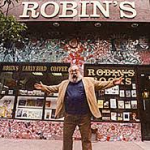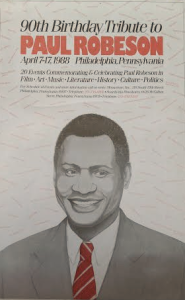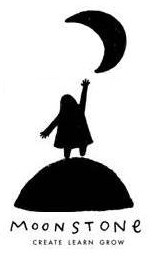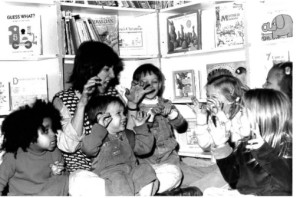About Moonstone
35 Years of History
 Moonstone began in 1981 on the second floor of Robin’s Book Store, where Sandy Robin developed a series of Saturday morning children’s programs and Larry Robin presented poets and authors.
Moonstone began in 1981 on the second floor of Robin’s Book Store, where Sandy Robin developed a series of Saturday morning children’s programs and Larry Robin presented poets and authors.
Incorporated as a 501©3 non-profit corporation in February 1983, Moonstone Inc. was established to manifest the Robins’ belief that learning is a life-long activity and that art stimulates both cognitive and affective learning at all ages. While literature has been at the center of Moonstone’s programming, Larry and Sandy believe that Art, in all its forms, is more than enrichment for occasional dabbling; it affects how one thinks, sees, interprets, describes, meets life and functions in society. Today, the work of Moonstone Inc. is to operate the Moonstone Preschool and the Moonstone Arts Center, bringing together a community of parents, teachers, staff, board members, artists, poets and writers who believe that creativity and imagination are essential aspects of life.
Moonstone Arts Center began as Moonstone Readings at Robin’s Book Store. Although the bookstore closed in 2012, Larry’s connection to books and publishing created the opportunity to develop the Arts Center’s programs, which have brought writers into contact with each other and the reading public. Some notable Moonstone Arts Center programs were: The Celebration of Black Writing, which Moonstone presented for 18 years; The Paul Robeson Festival, presented for eight years; The Ink Programs (Philadelphia Ink, Women’s Ink, Children’s Ink, Red Ink, Poetry Ink) which remain ongoing. The Moonstone Arts Center strives to create a space where everyone has a voice. In recent years we have focused on poetry and history. (See detailed information about notable Moonstone Arts Center programs.)
Among the many distinguished writers and historians that Moonstone has presented to Philadelphia audiences are two United States Poet Laureates: Daniel Hoffman and Rita Dove; as well as all the Philadelphia Poet Laureates. We featured Pete Seeger twice, as well as Amiri Baraka, Howard Zinn and Nelson George.
Our Moonstone Gold Series has presented Major Jackson, Gregory Pardlo, E. Ethelbert Miller, Stephen Dunn, Samuel R Delany, Tim Seibles, Gerald Stern and Afaa Michael Weaver.
Ongoing Programs
Poetry
While we have introduced many distinguished nationally-known poets through our programs, our real objective is to support emerging artists. Many of yesterday’s “emerging” poets have become household names. A flyer for Moonstone Readings at Robin’s Bookstore for October/November 1993 included readings by poets and authors: Dennis Brutus (Oct 7), Ernest J. Gaines (Oct 8), Arthur Waskow (Oct 13), Ted Joans & Sonia Sanchez (Oct 19), Ernesto Cardenal (Oct 24), Derrick Bell (Oct 25), Sandra Benitez (Oct 27). Marjorie Agosin (Nov 5), David Levering Lewis (Nov 10), Maya Angelou (Nov. 15), Eleanor Wilner (Nov 17), and Michael S. Weaver (Dec 8).
Today, The Moonstone Poetry Series presents about 80 readings a year at four venues with two featured poets followed by an open reading. Our Philly Loves Poetry program on PhillyCAM (public access television) looks at the amazing variety of poetry groups in Philadelphia through discussion and reading. Our newest program is New Voices: Philadelphia’s Emerging Poets, being presented at the South Philadelphia Branch Library. New Voices features poets under the age of 25, including high school and college students.
The Moonstone Press publishes poetry anthologies from our group readings, poetry books and chapbooks by emerging and established poets. More information about Moonstone Press is included in this book.
Poetry Ink: 100 Poets Reading
is a seven hour poetry reading held every April, in which poets present their work back to back, often in pairings that create contrasts between styles, levels of experience and the culture of the poets themselves. “Nowhere else in Philly do we get such a wonderful mix of people, voices, and generations, and it is an experience in varieties of personalities as much as in poetry and poetics – everything from uplift to satire, from political protest to personal sorrow, love poems and tirades, transgression an decorum, the outrageous and the outraged, ranters and restrained formalists, street and academy, performance poets and shy ladies barely audible – pretty much the human spectrum. I loved listening…stayed a while, came back for more. Anyway, it was a great day…Only death is as great a leveler as Moonstone [Arts Center].” – Eleanor Wilner, author of Tourist in Hell and six other books as well as fellowships from MacArthur Foundation and the National Endowment for the Arts.
Distinguished Past Programs
The Celebration of Black Writing
started as a party on Sunday afternoon February 17, 1985 celebrating some of the great African American writers who lived in Philadelphia, growing to a a two day event with a panel discussing the State of Black Writing, storytelling with the Association of Black Storytellers and a book fair with forty authors. In 2000 the 16th Annual Celebration of Black Writing went international exploring the relationship between the Harlem Renaissance and the Négritude Movement with a five day program called Alchemy In Paris. In 2002 the Celebration of Black Writing became part of Art Sanctuary and they have grown the program into a month-long series of events.
El Festival Cubano
The first El Festival Cubano, held in 2001, built upon efforts to create a sister city relationship between Philadelphia and Santiago de Cuba. Although the sister-city relationship was never formally established, strong artistic and cultural links, especially with Santiago de Cuba, were created. The project promoted exchange between Cuban and Philadelphia arts and cultural organizations that lasted three years (2001 – 2003.)
The Paul Robeson Festival
 The Paul Robeson Festival which ran from 1987 to 1994, was developed by Moonstone in co-operation with Swords into Ploughshares and Charles L. Blockson Collection at Temple University. The Festival was designed as both a celebration of the life and work of Paul Robeson and as a forum that would encourage people to emulate his artistic and human integrity. The first Paul Robeson Festival was greeted in the Philadelphia Inquirer with the banner headline: “At last Philadelphia Honors Paul Robeson.” The Philadelphia City Council responded to the festival by recognizing April 5 – 11 1987 as “Paul Robeson Week in the City of Philadelphia” (Resolution no. 1016). The second Paul Robeson Festival celebrated Paul Robeson’s ninetieth birthday. Subsequent festivals explored the themes of art and activism as exemplified in Robeson’s life.
The Paul Robeson Festival which ran from 1987 to 1994, was developed by Moonstone in co-operation with Swords into Ploughshares and Charles L. Blockson Collection at Temple University. The Festival was designed as both a celebration of the life and work of Paul Robeson and as a forum that would encourage people to emulate his artistic and human integrity. The first Paul Robeson Festival was greeted in the Philadelphia Inquirer with the banner headline: “At last Philadelphia Honors Paul Robeson.” The Philadelphia City Council responded to the festival by recognizing April 5 – 11 1987 as “Paul Robeson Week in the City of Philadelphia” (Resolution no. 1016). The second Paul Robeson Festival celebrated Paul Robeson’s ninetieth birthday. Subsequent festivals explored the themes of art and activism as exemplified in Robeson’s life.
The Paul Robeson Festival led Moonstone to explore the relation between art and social activism with programs such as the Betrayed: Violence Against Women; Justice Month, with a discussion between Angela Davis and Sister Helen Perjean; The Richard Wright Centennial Celebration with a week of activities with Julia Wright; and Thomas Paine’s Legacy: Three Centuries of Revolution in Philadelphia. This series of programs developed into the Hidden History Project.
Hidden History Project
The Hidden History programs are city-wide festivals on the life and work of activists who struggled to make sure that “Life, Liberty and the Pursuit of Happiness” applied to everyone. These people are under-represented in our history books, sometimes mentioned in passing or getting a line or two.
Hidden History programs have included:
- 2009 – Thomas Paine: America’s Forgotten Founding Father (200th year after his death) – Thomas Paine wrote Common Sense in 1775 in Philadelphia and turned what was a tax revolt into a political revolution. He was the first person to assert that the common man could and should rule himself.
- 2009 – John Brown: 150 Years Later (150th year after his death) – John Brown’s attempt in 1859 to start a liberation movement among enslaved African Americans at Harpers Ferry, Virginia electrified the nation. This can be considered the first action in the American Civil War.
- 2011 – Frances Ellen Watkins Harper (100 years after her death) – an African-American writer, lecturer, and political activist, who promoted abolition, civil rights, women’s rights, and temperance. She lived at 10th and Bainbridge in Philadelphia. Philadelphia City Council Resolution #110085 adopted February 11, 2011 ”Recognizing the Week of February 20, 2011 as Frances Harper Week”
- 2011 – Emancipation (150 years after the firing of John C. Fremont) – major general in command of the Department of the West emancipated the slaves in Missouri on August 30, 1961. President Abraham Lincoln asked Frémont to revise the order. Frémont refused to do so. Lincoln responded by firing him on November 2, 1861.
- 2012 – Martin R. Delany (200th birthday) – an African-American abolitionist, journalist, physician, and writer, arguably the first proponent of American Black Nationalism. Philadelphia City Council Resolution adopted March 15, 2012 “Recognizing the Week of May 6-12 as Martin Delany Week
- 2013 – Ida B. Wells (150th birthday) – an African-American journalist and newspaper editor who documented lynching in the United States, showing how it was often a way to control or punish blacks who competed with whites.
- 2013 – Voices of Women – looked at how Women’s Suffrage emerged from the Anti-Slavery movement with programs on Lucretia Mott, Margaret Fuller and Harriet Jacobs.
- 2014 – Charlotte Forten Grimké (100 years after her death) – one of the most influential antislavery activists of her time, first northern African-American schoolteacher to go south to teach former slaves.
- 2014 – The Underground Railroad in Philadelphia – with emphasis on Robert Purvis, William Still and the Philadelphia Female Anti-Slavery Society.
- 2015 – Education in Black and White – a look at the history of Black Education with emphasis on the Institute for Colored Youth, 915 Bainbridge Street, founded in 1852, Octavius V. Catto and Fanny Jackson.
- 2017 – Centennial of the year that changed history with programs on poetry of the First World War, the first major Women’s march, the Immigration Act of 1917, the Espionage Act of 1917.
The Moonstone Preschool
The core of  the Moonstone Preschool is a thematic approach to the use of multiple intelligence theory. The arts based curriculum is grounded in the progressive educational philosophies of John Dewey, with an understanding of the significance of art in cognitive and affective development as expressed by Elliot Eisner and the concepts of multiple intelligence developed by Howard Gardner.
the Moonstone Preschool is a thematic approach to the use of multiple intelligence theory. The arts based curriculum is grounded in the progressive educational philosophies of John Dewey, with an understanding of the significance of art in cognitive and affective development as expressed by Elliot Eisner and the concepts of multiple intelligence developed by Howard Gardner.
Moonstone believes in Diversity and Imagination, in the importance of being in contact with people who do not look alike, sound alike, think alike or solve problems in the same ways.
The Moonstone Method
Moonstone Preschool is based on the Moonstone Method, a unique approach to early education developed by Sandy Robin, founder of our preschool. The Method is grounded in a progressive educational philosophy that believes the basis of learning is through personal experience. We believe students thrive in an environment where they can experience and interact with the curriculum, through the curriculum, and with each other. A preschool is an important place to acquire knowledge, but also a place to learn how to live.
 Moonstone’s Method utilizes a thematic approach, in which an open-ended central theme is used to unite the child’s various intelligences and teachers’ instructional styles. This approach is designed to reinforce critical thinking and communication through questioning, discussions and activities. All teachers use the same theme, allowing children to experience variety in perspectives, teaching styles and materials. This use of a single theme engages each student through their learning strengths and multiple intelligences.
Moonstone’s Method utilizes a thematic approach, in which an open-ended central theme is used to unite the child’s various intelligences and teachers’ instructional styles. This approach is designed to reinforce critical thinking and communication through questioning, discussions and activities. All teachers use the same theme, allowing children to experience variety in perspectives, teaching styles and materials. This use of a single theme engages each student through their learning strengths and multiple intelligences.
Children learn in different ways, according to the theory of Multiple Intelligence, which is the underpinning of the Moonstone Method. We believe that all of us are able to know the world through language, logical-mathematical analysis, spatial representation, musical thinking, and the use of the body to solve problems or to make things, and to understand other individuals, ourselves and nature. But where individuals differ is in the strength of these intelligences and in the ways they are invoked and combined to carry out different tasks, solve diverse problems, and progress in various domains.
The arts are our entry to the Multiple Intelligences. At Moonstone, we emphasize the importance of art in the cognitive development of the child. Art stimulates imagination, allows for multiple answers to every question, and teaches children to create meaning from experience.

About Moonstone by Larry Robin is licensed under a Creative Commons Attribution-NonCommercial-ShareAlike 4.0 International License.
Permission is granted to copy, distribute and/or modify this document under the terms of the GNU Free Documentation License, Version 1.3 or any later version published by the Free Software Foundation; with no Invariant Sections, no Front-Cover Texts, and no Back-Cover Texts.
